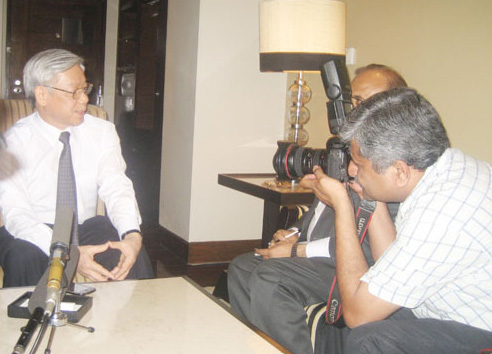Vietnam’s international status elevated
Vietnam has now established diplomatic ties with 177 different countries and 244 economic and trade organisations around the world. This has helped Vietnam maintain socio-political stability and improve people’s living standards.
The Chairman of the National Assembly (NA) Nguyen Phu Trong and his delegation are currently on a visit to India at the invitation of Indian Lower House Speaker Meira Kumar. India’s Express News Service interviewed Mr Trong about Vietnam-India relations, Vietnam’s experience in implementing a socialist-oriented market economy, and some other issues.

Reporter: What is your assessment of India’s role in your country’s foreign policy?
Mr Trong: Vietnam and India have a time-honoured friendship, built on long-term relations in culture, trade and religion. President Ho Chi Minh and Indian Prime Minister Jawaharlal Nehru laid a firm foundation for these relations, which have now grown into a comprehensive and strategic partnership.
Through its Doi Moi (Renewal) process, Vietnam is striving to become a modern and industrialized nation by 2020 and will continue to pursue a socialist-oriented market economy and promote international integration. India currently has an important voice and position at both regional and world forums, so we consider India an indispensable part of our current development.
Reporter: Could you please elaborate on Vietnam’s experience in shifting its centralized economy to a market economy?
Mr Trong: We have gone through various stages of economic development, from a commodity economy to a socialist-oriented market economy.
At present, there are a number of possible economic models: free market, socialist market, socialist-oriented market, China-style socialist market. We call our model a socialist-oriented market economy because it both observes the rules of the market economy and follows socialist orientations. This means that focusing on economic growth must go hand in hand with addressing social issues to ensure social equality, narrow the gap between rich and poor, and reduce poverty.
In fact, Vietnam’s market economy is neither a free market economy and nor a socialist market economy as the country is in a transitional period. Vietnam has to deal carefully with issues related to supply and demand and State policies and strategies, preservation of national cultural identity, international integration and preserve environmental protection. By doing so, Vietnam will be able to ensure sustainable development and socialist orientations.
In terms of poverty reduction, the number of poor households has dropped to under 10 percent from 48 percent previously as a result of the country’s efforts to maintain socio- political stability.
Reporter: You have just alluded to citizens’ feedback. What’s the CPV evaluation of this? And is the Party content with its achievements?
Mr Trong: Initiatives of the socialist-oriented market economy have brought benefits to the citizens, so they have gotten warm support from the citizens. We considered the renewal process over the past 20 years to be a success. Vietnam has shed its underdeveloped status. In the past, Vietnamese were unable to earn a crust. Now goods are flooding the market.
After being closed for many years, Vietnam has opened its doors to all the countries of the world. Vietnam has established diplomatic ties with 177 countries and relations with 224 economic and trade organisations. The country’s status in the international arena is increasingly rapidly. Theoretically, our economic model is an evolution of the economic theories of Karl Marx and other economists.
Reporter: You have mentioned to the free market. Do you think it might be time for Vietnam to have a multiparty system or other parties besides the CPV?
Mr Trong: Economic and political systems are dialectically related. Vietnam focuses on economic development and is gradually revising the political system at the same time. Our socio-politics are stable and the citizens are the masters. The National Assembly operates democratically. Other agencies and organisations are observing the NA’s operation and the country is developing strongly. Experience shows that one Party is the most effective way.
We know that world opinion is wondering why Vietnam has only one Party and why it does not implement a multiparty system. I do not think that the more parties there are the more democratic a country is. Different countries have different histories. The most important criteria are whether society improves, whether citizens have prosperous and happy lives, and whether the country is stable.
I am not opposed a country having a multiparty system. Some countries have kings, others have prime ministers, several do not have prime ministers, and some even have both presidents and prime ministers. Each country has its own organisational structure. I do not think that the market economy has to have a multiparty system. Objectively speaking, such a system is not necessary, at least for the present.
Reporter: Thank you very much.
(VOV)

